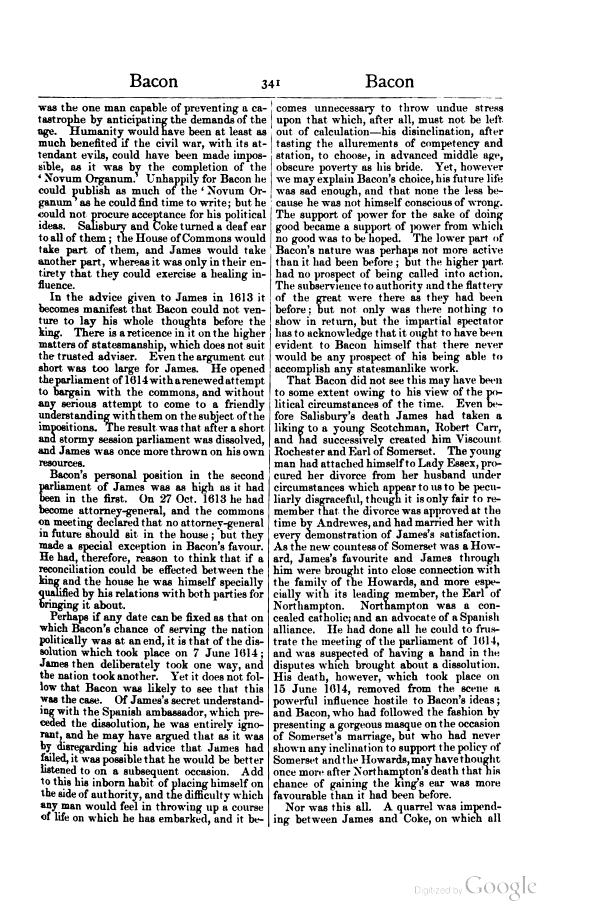was the one man capable of preventing a catastrophe by anticipating the demands of the age. Humanity would have been at least as much benefited if the civil war, with its attendant evils, could have been made impossible, as it was by the completion of the 'Novum Organum.' Unhappily for Bacon he could publish as much of the 'Novum Organum' as he could find time to write; but he could not procure acceptance for his political ideas. Salisbury and Coke turned a deaf ear to all of them; the House of Commons would take part of them, and James would take another part, whereas it was only in their entirety that they could exercise a healing influence.
In the advice given to James in 1613 it becomes manifest that Bacon could not venture to lay his whole thoughts before the king. There is a reticence in it on the higher matters of statesmanship, which does not suit the trusted adviser. Even the argument cut short was too large for James. He opened the parliament of 1614 with a renewed attempt to bargain with the commons, and without any serious attempt to come to a friendly understanding with them on the subject of the impositions. The result was that after a short and stormy session parliament was dissolved, and James was once more thrown on his own resources.
Bacon's personal position in the second parliament of James was as high as it had been in the first. On 27 Oct. 1613 he had become attorney-general, and the commons on meeting declared that no attorney-general in future should sit in the house; but they made a special exception in Bacon's favour. He had, therefore, reason to think that if a reconciliation could be effected between the king and the house he was himself specially qualified by his relations with both parties for bringing it about.
Perhaps if any date can be fixed as that on which Bacon's chance of serving the nation politically was at an end, it is that of the dissolution which took place on 7 June 1614; James then deliberately took one way, and the nation took another. Yet it does not follow that Bacon was likely to see that this was the case. Of James's secret understanding with the Spanish ambassador, which preceded the dissolution, he was entirely ignorant, and he may have argued that as it was by disregarding his advice that James had failed, it was possible that he would be better listened to on a subsequent occasion. Add to this his inborn habit of placing himself on the side of authority, and the difficulty which any man would feel in throwing up a course of life on which he has embarked, and it becomes unnecessary to throw undue stress upon that which, after all, must not be left out of calculation — his disinclination, after tasting the allurements of competency and station, to choose, in advanced middle age, obscure poverty as his bride. Yet, however we may explain Bacon's choice, his future life was sad enough, and that none the less because he was not himself conscious of wrong. The support of power for the sake of doing good became a support of power from which no good was to be hoped. The lower part of Bacon's nature was perhaps not more active than it had been before; but the higher part had no prospect of being called into action. The subservience to authority and the flattery of the great were there as they had been before: but not only was there nothing to show in return, but the impartial spectator has to acknowledge that it ought to have been evident to Bacon himself that there never would be any prospect of his being able to accomplish any statesmanlike work.
That Bacon did not see thip may have been to some extent owing to his view of the political circumstances of the time. Even before Salisbury's death James had taken a liking to a young Scotchman, Robert Carr, and had successively created him Viscount Rochester and Earl of Somerset. The young man had attached himself to Lady Essex, procured her divorce from her husband under circumstances which appear to us to be peculiarly disgraceful, though it is only fair to remember that the divorce was approved at the time by Andrewes, and had married her with every demonstration of James's satisfaction. As the new countess of Somerset was a Howard, James's favourite and James through him were brought into close connection with the family of the Howards, and more especially with its leading member, the Earl of Northampton. Northampton was a concealed catholic, and an advocate of a Spanish alliance. He had done all he could to frustrate the meeting of the parliament of 1614, and was suspected of having a hand in the disputes which brought about a dissolution. His death, however, which took place on 15 June 1614, removed from the scene a powerful influence hostile to Bacon's ideas; and Bacon, who had followed the fashion by presenting a gorgeous masque on the occasion of Somerset's marriage, but who had never shown any inclination to support the policy of Somerset and the Howards, may have thought once more after Northampton's death that his chance of gaining the king's ear was more favourable than it had been before.
Nor was this all. A quarrel was impending between James and Coke, on which all
